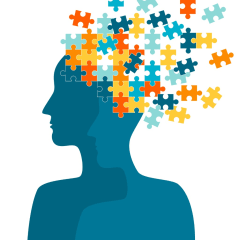How to Choose the Best Psychologist in Delhi for Personalized Therapy
How to Choose the Best Psychologist in Delhi for Personalized Therapy
Blog Article
Psych Therapy: A Comprehensive Overview to Results and techniques

Cognitive-Behavioral Treatment
Cognitive-Behavioral Therapy (CBT) is a commonly made use of psychotherapeutic method that concentrates on identifying and changing dysfunctional thinking and habits patterns. Created in the 1960s by Aaron T. Beck, CBT combines cognitive and behavior concepts to address different psychological health and wellness issues, consisting of depression, anxiety, and stress-related conditions.
Techniques such as cognitive restructuring, direct exposure treatment, and skill-building exercises are commonly used. Cognitive restructuring entails difficult and altering negative idea patterns, while exposure treatment intends to decrease fear and anxiousness with gradual direct exposure to been afraid things or circumstances.
Evidence-based research supports the effectiveness of CBT for a vast array of emotional conditions - Best Psychologist in Delhi. Its emphasis on skill procurement and self-help methods empowers customers to continue progression separately after treatment wraps up. The adaptability and performance of CBT have actually made it a foundation in modern psychotherapeutic technique
Psychodynamic Strategies
Rooted in the early theories of Sigmund Freud, psychodynamic approaches concentrate on checking out the subconscious mind and its influence on actions and emotions. These techniques aim to discover hidden thoughts and sensations that may be driving maladaptive habits and emotional distress. Central to this method is the principle of internal conflict, often coming from unsolved past experiences, especially those from youth.
Therapists utilizing psychodynamic methods use several crucial approaches, including complimentary organization, where patients are motivated to talk openly to reveal unconscious product, and desire evaluation, which interprets the concealed web content of desires. Additionally, the exploration of transference and countertransference dynamics within the restorative partnership is essential. These interactions can supply understandings right into the patient's internal world and relational patterns.
Psychodynamic therapy is typically longer-term compared to other techniques, offering a detailed and deep understanding of the person's subconscious. Research suggests that it can be especially efficient for complicated psychological health and wellness problems, such as character conditions and persistent anxiety. By promoting self-awareness and emotional insight, psychodynamic therapy seeks to bring unconscious product to awareness, making it possible for people to attain purposeful and long-term adjustment in their lives.
Humanistic Methods
Building on the foundations laid by psychodynamic approaches, humanistic strategies supply a distinctive viewpoint concentrated on individual potential and self-actualization. Stemming in the mid-20th century, these strategies prioritize the fundamental goodness and development possibility of people, stressing an alternative view of human experience. Trick numbers such as Carl Rogers and Abraham Maslow have significantly affected this restorative method, which encompasses approaches like client-centered therapy and Gestalt therapy.
Client-centered therapy, created by Rogers, plays an essential role in humanistic methods. The therapist's function is even more of a facilitator than an authority, encouraging customers to harness their internal resources for healing.
Gestalt treatment, another crucial humanistic technique, highlights existing minute understanding and the assimilation of mind and body. By concentrating on the "present moment," clients obtain greater understanding right into their current emotions and habits. Strategies such as role-playing and directed visualization are usually employed to assist customers obtain a deeper understanding of themselves, eventually resulting in boosted self-awareness and fulfillment.
Integrative Therapies
Integrative treatments stand for a synthesis of numerous therapeutic strategies tailored to satisfy the one-of-a-kind needs of each client. This technique recognizes the intricacy of human psychology and the multifaceted nature of mental health problems. By integrating aspects from various colleges of psychiatric therapy-- such as cognitive-behavioral treatment (CBT), psychodynamic treatment, and humanistic approaches-- integrative therapies offer a more versatile and alternative treatment paradigm.
Professionals of integrative treatment examine each customer's certain requirements, signs, and individual background to create a personalized therapy strategy. This customized strategy boosts the possibility for restorative success by attending to the source of psychological distress and promoting important link total health. Methods may include mindfulness exercises, cognitive restructuring, and psychological handling, each chosen to target different facets of the client's concerns.
Furthermore, integrative therapies stress the therapeutic relationship, watching the client-therapist bond as an essential part of reliable treatment. This connection promotes a supportive setting where clients really feel risk-free to explore and address their concerns. The flexibility of integrative therapies makes them ideal for a broad series of problems, including anxiousness, depression, injury, and interpersonal problems, thereby raising their this link applicability and efficiency in varied medical setups.

Determining Treatment Results
Assessing the effectiveness of psychiatric therapy is important for both clinicians and customers to guarantee that the therapy is yielding the wanted results. To attain this, different approaches and tools are used to measure treatment outcomes systematically. Standard assessment instruments, such as the Beck Anxiety Supply (BDI) and the Generalized Anxiety Condition 7 (GAD-7), supply quantitative information on sign extent and adjustments gradually.
In addition to standardized tools, qualitative approaches like customer self-reports and clinical interviews supply valuable insights right into the individual experiences and perceived progress of customers. Regularly scheduled analyses, typically at the beginning, navel, and end of treatment, help in tracking the trajectory of enhancement or determining locations requiring adjustment.
Outcome measurement is not limited to sign decrease; it likewise incorporates functional improvements in every day life, such as much better social partnerships, raised job performance, and boosted overall well-being. Modern advancements in digital health have introduced mobile applications and online systems that promote real-time surveillance and responses, further refining the assessment process.
Eventually, an extensive strategy to measuring therapy outcomes makes certain that healing treatments work, reliable, and customized to meet the specific requirements of customers, therefore maximizing the overall restorative Discover More Here experience.
Conclusion
Humanistic strategies concentrate on personal development and self-actualization, while integrative treatments incorporate multiple techniques for tailored treatment strategies. Reviewing treatment results via standardized analyses and qualitative methods guarantees a thorough understanding of effectiveness, eventually leading customers toward withstanding psychological wellness renovations.
From the structured method of Cognitive-Behavioral Treatment (CBT) to the deep expedition of the subconscious in psychodynamic treatment, each method brings distinct benefits. Its focus on skill purchase and self-help methods encourages customers to proceed progression independently after therapy concludes (Best Psychologist in Delhi). Secret figures such as Carl Rogers and Abraham Maslow have actually dramatically affected this healing approach, which encompasses methods like client-centered therapy and Gestalt therapy

Report this page